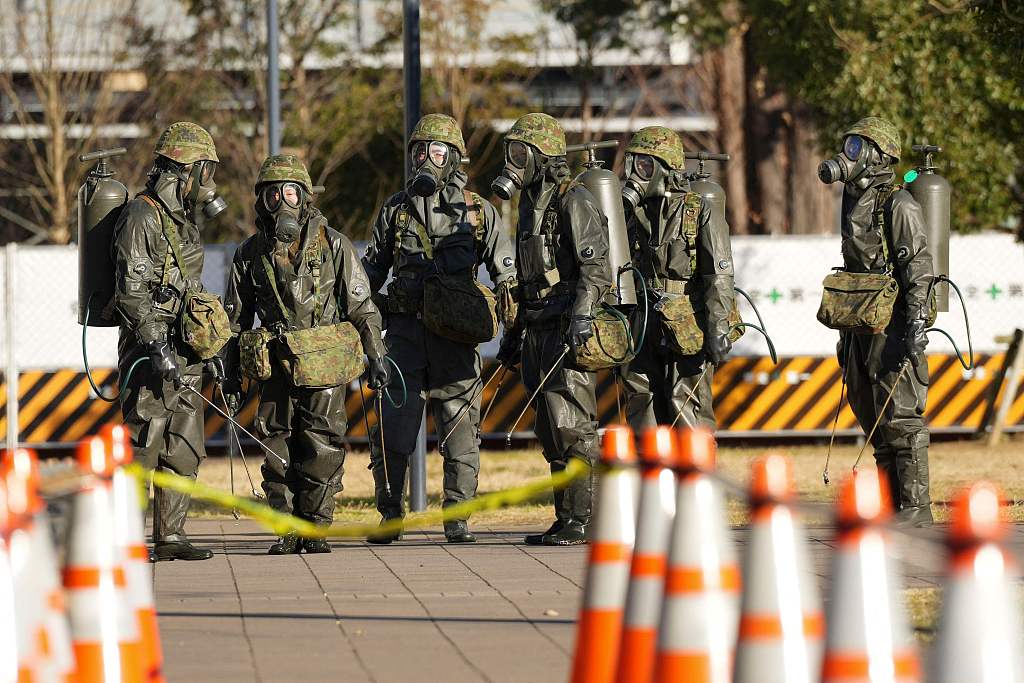Japan urged to never wage war again


Japan's opposition party and civic group leaders urged the Japanese government to seriously reflect on the past, seek peaceful diplomacy centering on civil exchanges, and never go to war again at a memorial in Tokyo on Thursday.
Masashi Tani, secretary-general of the Tokyo-based Forum for Peace, Human Rights and Environment, said after the memorial mourning the war dead at Chidorigafuchi National Cemetery, "The purpose of today's rally is to offer our condolences to all those who lost their lives in the war, and also to use the occasion to say that we will never repeat war again."
Tani emphasized that peace cannot be achieved through armed confrontation.
"The most important thing for the Japanese government in its relations with foreign countries is peaceful diplomacy centering on civil exchanges, rather than a foreign policy that incites tension," said Tani.
"We believe that reflection on the past and an apology are essential for envisioning the future. If we do not start from that point, we will be left with the idea of justifying what we have done in the past. Therefore, a peaceful society can only come from a future in which we properly acknowledge the mistakes we have made in the past and apologize for them," he said on the day when Japan marked the 79th anniversary of its surrender in World War II.
Mizuho Fukushima, head of the Social Democratic Party of Japan, said at the memorial: "The lesson we can learn from the damage caused by war is that we must never go to war again. But Japanese politics is clearly against this."
The ruling Liberal Democratic Party, or LDP, promoted legislation that was passed in September 2015 to allow the country's military to participate in foreign conflicts, overturning its previous policy of fighting only in self-defense. In December 2022, Japanese Prime Minister Fumio Kishida's Cabinet approved revision of three key national security documents.
"I have walked the sites in the southwestern islands of Okinawa since 2016…Every island is being turned into a military fortress, and preparations for war are underway. If we attack enemy bases in the exercise of the right of collective self-defense, it could be considered a preemptive attack by the other country, and Japan could be covered under the sun," said Fukushima.
Last year, the National Diet, Japan's national legislature, passed the Act on Enhancing Defense Production and Technology Bases to revitalize the country's defense industrial base.
Fukushima emphasized that Japan must never go to war in Asia because of its aggression against the region during World War II, and anywhere in the southwestern islands of Okinawa and all of Japan must not become a battlefield.
At a meeting of the LDP's Headquarters for the Realization of Revision of the Constitution on Aug 7, Kishida expressed his intention to prioritize adding a contingency clause to the Constitution to deal with such matters as armed attacks and large-scale disasters.
The contingency clause is martial law, which centralizes power in the Cabinet and stops the Diet as the sole legislature, said Fukushima.
"The Constitution of Japan was obtained by us with many sacrifices, and no war is Japan's promise to the Japanese people and the world. It is not the preparation for war that is necessary now, but the construction of peace diplomacy. We need a political shift," she said.
Kenta Izumi, the leader of the Constitutional Democratic Party of Japan, did not attend the memorial, but his speech was read by the moderator.
"In the midst of the turbulent international community, Japan made a mistake in its national policy during World War II, and proceeded on the path of territorial expansion and war. As a result, more than 3 million people lost their lives, and the people of other countries, especially those in Asia, suffered tremendous damage and pain," said Izumi.
"Today, on this day of discussion and the end of the war, we renew our resolve for peace and stability in the world," he said, conveying the idea that all conflicts should be resolved peacefully and diplomatically, not through the use of force.
Japan has been marching headlong down the path of becoming a military superpower, doing as it is told by the United States, especially since the second Abe Cabinet under the leadership of Japan's former prime minister Shinzo Abe, said Masatoshi Uchida, secretary-general of the Committee of 1,000 to Prevent War.
Hiroyuki Some, co-representative of the Forum for Peace, Human Rights and Environment, also believes that Japan's steps today go against the principles of the Constitution and are about to return to discipline in the prewar and wartime state.
He noted that after the war, Japan was supposed to have made a resolution never to become a military superpower that threatens other countries by adopting a policy denying the exercise of the right of collective self-defense and banning the export of arms.
"Japan is now running after an arms buildup. I cannot help but fear that Japan today poses a threat to neighboring countries in Asia and is amplifying mutual distrust," said Some.
Reflecting on World War II, he said: "We must not merely understand that epic matchup as a historical fact, but that it must never be repeated. It is our responsibility today to pass the story on from generation to generation, and to ensure that a peaceful society is passed on to the future."































